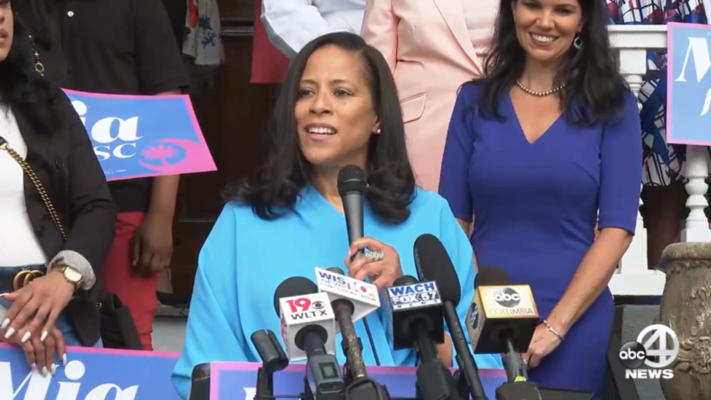State Senator Becomes First Black Woman To Run For Governor
 SC State Senator Mia McLeod
SC State Senator Mia McLeod
A South Carolina state senator made history this week, entering the state's 2022 Gubernatorial race, becoming the first Black woman in history to do so.
Democrat Mia McLeod officially launched her campaign for South Carolina governor on Thursday, telling the Associated Press, "I want to be the person that is running not because I'm a woman, and not because I'm Black, but because I am so connected to and so much like the people I represent. It's a tremendous responsibility, but it's one I'm excited about."
McLeod, 52, was elected to the State House in 2010 and the Senate in 2016.
Her state Senate race was won by more than 24 points, making her the first woman and first African-American to win the seat. However, she likely faces a stiff challenge seeking the governorship of a state that has become reliably Republican.
In a video announcement released Thursday morning, McLeod said she comes from "a long line of servant leaders" and was born and raised in Bennettesville, South Carolina, calling it "the place that shaped me."
Her campaign website describes her as "running for governor so that South Carolina can be a place that is full of opportunity…a place that her two young adult sons and other young South Carolinians can be proud to call home and want to come back to when they're ready to start their families."
According to the website, McLeod's son BJ lives in Columbia, South Carolina, while her other son, Cam, lives in Colorado, where he plays football at Colorado State University.
McLeod is already on the radar of national politicians, with Democratic National Committee Chair Jaime Harrison sharing her announcement video along with a message of congratulations on Twitter.
"Congratulations to my friend Mia! Mia is a superstar and a tremendous public servant! She is one of the great Democrats running for Governor in SC in 2022," Harrison, who unsuccessfully challenged Sen. Lindsey Graham last year, wrote.
McLeod has made headlines in South Carolina in recent years, revealing in January that she was a victim of sexual assault during a tense debate on a soc-called "fetal heartbeat" bill.
As The State reported, after Republican state Sen. Richard Cash said during debate over the bill that some rape survivors were grateful to give birth to a child, McLeod took the podium to say she "could barely contain herself," offering a personal story about such a bill could affect survivors of sexual assault.
"Clearly, he has never been raped," McLeod said, referring to Cash. "It's probably safe to say that the 40 men in this chamber and the 100 in the House chamber haven't either. Well, I have."
She continued, saying she had never told the story previously, "not because I didn't want to and definitely not because I didn't need to, but because I was afraid to."
She also criticized a measure in the bill that would require doctors to report if a female patient said they were a victim of rape or incest, noting that 45 of South Carolina's 46 sheriffs were men.
"Does it make you feel good when women have to relive the horror, the unspeakable shame and the trauma of all that we've experienced at the hands of a man?" McLeod said. "Then, to add insult to injury, you force us to retell it to yet another man, this one with a badge. Just like rape. This bill is about power and control. Raped by a man. Now forced to report it to a man. Governed by a body of men."
In delivering South Carolina Democrats' rebuttal to Republican Gov. Henry McMaster's State of the State address, McLeod said that South Carolina was not in good hands under its current leadership.
"It doesn't have to be this way," she said in January during her rebuttal speech. "With all due respect, governor, because you've failed to lead us, the current state of our state is bleak."
If elected, McLeod would be just the second female governor in South Carolina's history.
The first, Republican Nikki Haley, served in the role from 2011 to 2017, resigning from her second term early to serve as the U.S. ambassador to the United Nations for nearly two years under the Trump administration.
Please support The Community Times by subscribing today!
You may also like:







